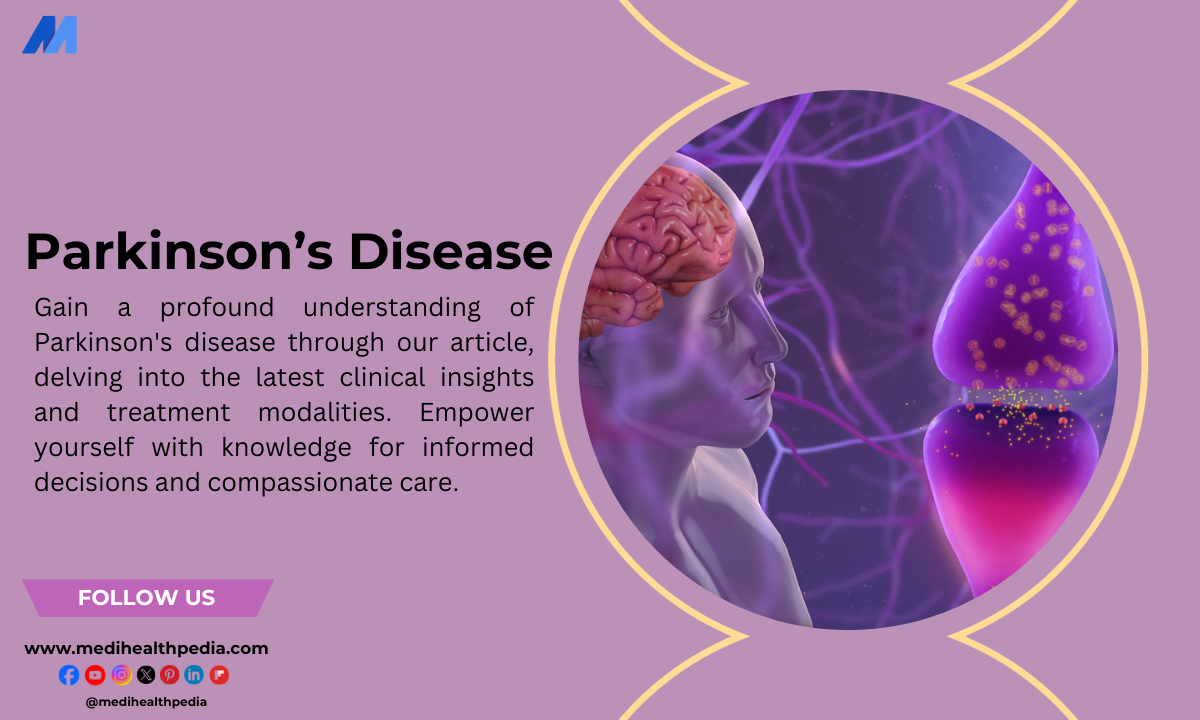Empowering Lives with Parkinson's Disease: A Comprehensive Guide to Clinical Insights, Treatment Strategies, and Enhanced Quality of Life
- Empowering Lives with Parkinson's Disease: A Comprehensive Guide to Clinical Insights, Treatment Strategies, and Enhanced Quality of Life
- Introduction
- Clinical Overview of Parkinson's Disease
- Clinical Presentation of Parkinson's Disease
- Basic Investigations for Parkinson's Disease
- Complications of Parkinson's Disease
- Conventional Treatment of Parkinson's Disease
- Prevention of Parkinson's Disease
- Herbal Medicines for Parkinson's Disease Treatment
- Lifestyle Modification for Parkinson's Disease Management
- Conclusion
Introduction
Parkinson’s Disease, a complex and prevalent neurological disorder, demands a deep understanding of its clinical overview, clinical presentation, and diagnostic aspects to empower individuals with the knowledge and resources needed for effective management. While conventional treatments remain a cornerstone, exploring prevention strategies, herbal remedies, and lifestyle modifications can provide valuable supplementary support.
Living with Parkinson’s Disease may present numerous challenges, but with the right knowledge, a multidisciplinary approach, and a strong support network, individuals can improve their quality of life, manage symptoms, and make informed decisions about their care. Education, awareness, and a supportive network of healthcare professionals and loved ones are crucial components of the journey to achieve better health and well-being in the face of Parkinson’s Disease.

Clinical Overview of Parkinson's Disease
Understanding the clinical overview of Parkinson’s disease is crucial for comprehending the intricacies of this condition:
- Definition: Parkinson’s disease is a neurodegenerative disorder characterized by the loss of dopamine-producing cells in the brain, resulting in motor and non-motor symptoms.
- Prevalence: It is one of the most prevalent neurodegenerative disorders, with a higher incidence in individuals over the age of 60.
- Pathophysiology: The disease’s onset is associated with the accumulation of alpha-synuclein protein, leading to the loss of motor control and a wide range of non-motor symptoms.
- Etiology: While the precise cause remains unknown, a combination of genetic and environmental factors is believed to contribute to the development of Parkinson’s Disease.
Clinical Presentation of Parkinson's Disease
Parkinson’s Disease is characterized by a spectrum of motor and non-motor symptoms, including:
Motor Symptoms:
- Tremors: Involuntary shaking, typically starting in the hands and gradually affecting other parts of the body.
- Bradykinesia: Slowness of movement, making daily tasks progressively challenging.
- Rigidity: Stiffness in the limbs and trunk, leading to a limited range of motion.
- Postural instability: Impaired balance and coordination, increasing the risk of falls.
Non-Motor Symptoms:
- Depression: Affecting mood and emotional well-being, often a result of chemical imbalances in the brain.
- Cognitive impairment: Memory and thinking difficulties, which can occur in advanced stages and lead to dementia.
- Sleep disturbances: Commonly manifested as insomnia and restless legs syndrome.
- Autonomic dysfunction: Symptoms such as constipation and fluctuations in blood pressure can arise, impacting overall well-being.
Basic Investigations for Parkinson's Disease
Diagnosing Parkinson’s Disease involves a combination of clinical assessments and diagnostic tests, including:
- Medical history and neurological examination: Evaluating the patient’s history, motor function, and the presence of specific symptoms.
- DaTscan: A brain imaging technique used to assess dopamine levels and detect changes in the brain’s structure.
- Blood tests: Conducted to rule out other conditions with similar symptoms and assess various blood markers.
- Magnetic Resonance Imaging (MRI): Used to rule out structural brain abnormalities and to provide additional information for diagnosis.
Complications of Parkinson's Disease
Insufficiently managed or untreated Parkinson’s Disease can lead to various complications, including:
- Falls and injuries: Reduced balance and motor control increase the risk of accidents, which can result in fractures and other injuries.
- Medication side effects: Conventional treatments may cause adverse reactions like dyskinesia, which involves involuntary and abnormal movements.
- Cognitive decline: Some individuals may experience dementia or cognitive impairment in the advanced stages, affecting their ability to think, remember, and make decisions.
- Psychiatric issues: Depression and anxiety are common and may require treatment to enhance the individual’s mental well-being.
Conventional Treatment of Parkinson's Disease
The management of Parkinson’s Disease typically involves a combination of therapeutic approaches:
- Medications: Dopamine replacement therapy, such as levodopa, helps manage motor symptoms by replenishing dopamine levels in the brain.
- Physical therapy: Exercises and rehabilitation programs aim to enhance motor skills, mobility, and overall physical well-being.
- Deep brain stimulation (DBS): This surgical procedure involves the implantation of electrodes in specific brain areas to alleviate motor symptoms and improve quality of life.
- Speech therapy: Addressing speech and swallowing difficulties, improving communication, and enhancing daily life activities.
- Occupational therapy: Assisting individuals in maintaining independence and quality of life, addressing issues related to daily tasks and routines.
Prevention of Parkinson's Disease
Although the exact cause of Parkinson’s Disease remains unknown, adopting certain lifestyle modifications may contribute to prevention:
- Regular exercise: Engaging in physical activity has been associated with a reduced risk of developing the disease, as it supports overall health and may have a protective effect on the brain.
- Antioxidant-rich diet: Consuming foods that are rich in antioxidants, such as fruits and vegetables, may have a protective effect against Parkinson’s Disease.
- Avoiding environmental toxins: Reducing exposure to pesticides and herbicides in the environment may minimize the risk of developing the disease.
- Caffeine consumption: Some studies suggest that moderate caffeine intake may be associated with a lower risk of Parkinson’s Disease.
Herbal Medicines for Parkinson's Disease Treatment
Complementary herbal remedies may offer support in managing some symptoms and enhancing overall well-being:
- Ginkgo Biloba: Known for its potential cognitive benefits, Ginkgo Biloba may help manage memory and thinking difficulties in individuals with Parkinson’s Disease.
- Mucuna Pruriens: This herb contains levodopa and may help alleviate motor symptoms by providing a natural source of dopamine.
- Turmeric: Renowned for its anti-inflammatory properties, turmeric may assist in reducing inflammation associated with the disease and alleviating certain symptoms.
Lifestyle Modification for Parkinson's Disease Management
Lifestyle changes play a crucial role in effectively managing Parkinson’s Disease:
- Physical activity: Regular exercise can improve balance, flexibility, and overall well-being, contributing to enhanced motor skills and a higher quality of life.
- Balanced diet: Consuming a nutrient-dense diet that includes a variety of foods from all food groups supports overall health and may improve the management of symptoms.
- Medication adherence: Following the prescribed medication regimen, attending medical appointments, and communicating effectively with healthcare providers are essential for optimal symptom management.
- Emotional support: Counseling, support groups, and a robust support system provide valuable emotional assistance for individuals and their families, helping them navigate the challenges associated with Parkinson’s Disease.
Conclusion
Parkinson’s Disease, a complex and prevalent neurological disorder, demands a deep understanding of its clinical overview, clinical presentation, and diagnostic aspects to empower individuals with the knowledge and resources needed for effective management. While conventional treatments remain a cornerstone, exploring prevention strategies, herbal remedies, and lifestyle modifications can provide valuable supplementary support.
Living with Parkinson’s Disease may present numerous challenges, but with the right knowledge, a multidisciplinary approach, and a strong support network, individuals can improve their quality of life, manage symptoms, and make informed decisions about their care. Education, awareness, and a supportive network of healthcare professionals and loved ones are crucial components of the journey to achieve better health and well-being in the face of Parkinson’s Disease.

